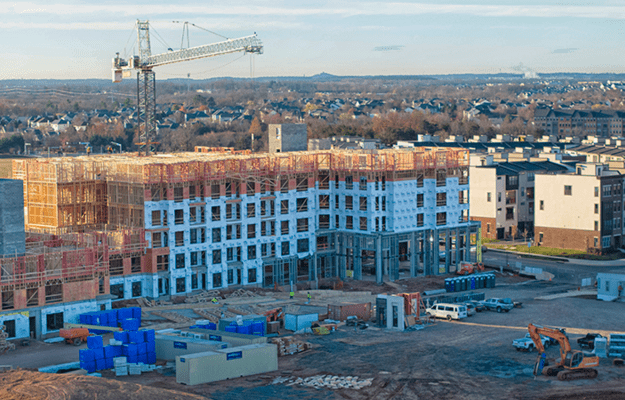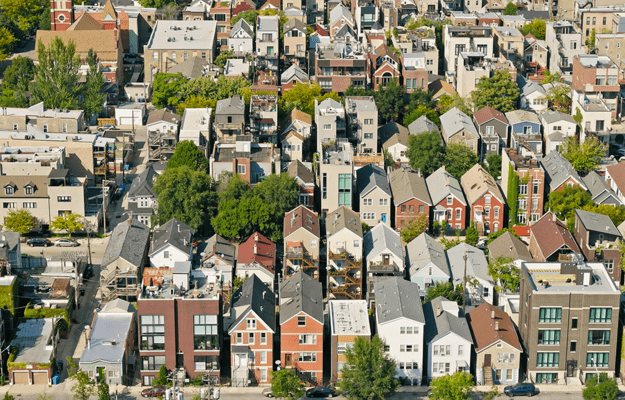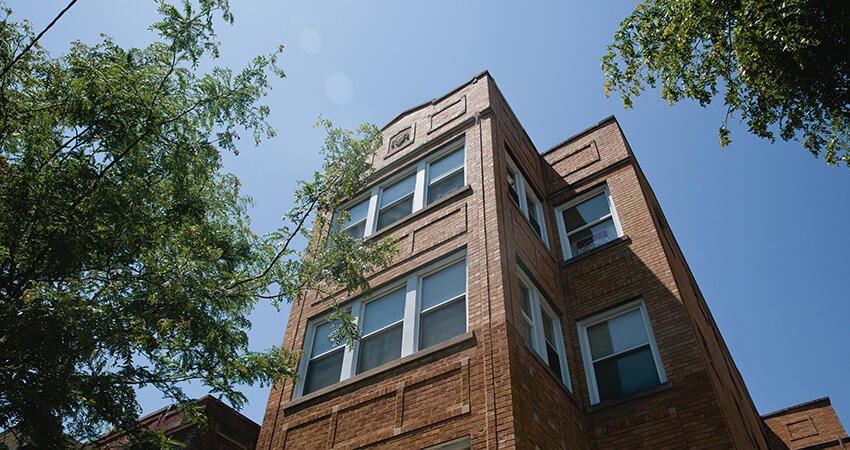
A building in Humboldt Park operated by LUCHA, a community-based, nonprofit affordable housing provider in Chicago. LUCHA partnered with Bickerdike and Elevate Energy to create R2I2.
Strengthening Families’ Financial Resilience through Savings
An unexpected hit to a family’s budget, such as losing a job or facing a health crisis, could mean the difference between staying in their home and facing eviction. That’s why financial savings are critical.
Urban Institute research shows that families with as little as $250 to $749 in savings are better able to weather temporary income drops and are less likely to be evicted or miss a housing or utility payment. And when families thrive financially, so do their communities. Financially stable residents are less likely to need city supports and services and can contribute more to the local economy. But more than a third of US households don’t have at least $250 in savings, putting them at a greater risk of being unable to pay rent and potentially facing eviction.
A new program, the Resident Resiliency Incentive Initiative (R2I2), is putting that evidence into action by assisting affordable housing residents in building small amounts of savings, with the goal of helping them become more financially secure and avoid housing instability.
R2I2—developed by the nonprofit Elevate Energy and community-based, nonprofit affordable housing providers Bickerdike and LUCHA—is starting small, working with four single mothers living paycheck to paycheck in Chicago’s Humboldt Park neighborhood. The Urban Institute’s technical assistance experts are supporting the Chicago-based partners by helping them ground their program—which aims to explore how financial education and reductions in energy and transportation costs can boost savings—in evidence.
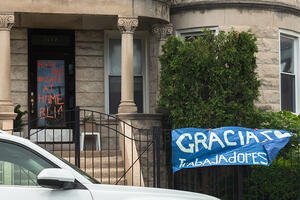
The Resident Resiliency Incentive Initiative (R2I2) is working with four single mothers who live in Humboldt Park, a neighborhood on the West Side of Chicago, where most residents are Latinx or Black.
The program was just getting started when the COVID-19 pandemic began spreading through the US, and the project partners had to pivot from some of their original plans. But the pandemic, which has disproportionately affected people in low-wage jobs and people in Black and Latinx communities, has also highlighted the financial precariousness families were already facing and the importance of having even a small savings buffer to weather emergencies.
Designing a program to boost savings and housing stability
The R2I2 program idea originated in October 2019 at Foundations for the Future of Housing, a conference Urban hosted in Chicago. The Elevate, Bickerdike, and LUCHA team—along with Northeast Energy Efficiency Partnerships and Post Normal—was one of three winning groups that participated in the conference’s design challenge, which secured the team technical assistance services and a small grant from the Urban Institute to help put their ideas into practice.
Because Bickerdike and LUCHA work closely with tenants, they know how common it is for their residents to face the risk of missing a rent payment if an unexpected bill comes up. Charlene Andreas, director of affordable housing at LUCHA, said that in conversations with residents with delinquent fees, she often hears about emergencies, such as health problems or a family member’s death, that led to missed rent payments.
“The research Urban shared really points out that what we’re seeing with our residents is so common,” Andreas said. “There are so many families living paycheck to paycheck who are really one emergency away from being in a situation that they can’t pay for their basic needs.”
Initially, the R2I2 program planned to address three areas of savings: energy, in which Elevate Energy would retrofit residents’ units with more energy-efficient devices to reduce energy costs; transportation, in which the partners would work with residents to assess their transportation costs and determine cost-saving solutions; and financial savings and coaching, in which R2I2 would set up a savings account with a local bank and offer financial coaching to help residents build more savings.
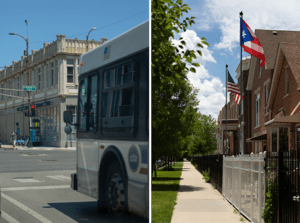
Left: A Chicago Transit Authority bus at a stoplight. Right: A street in Chicago’s Humboldt Park neighborhood. The R2I2 program aims to address multiple factors that could boost housing stability, including transportation savings, energy savings, and financial coaching.
“Although this is a housing project, we understand the connections between housing and many aspects of people’s lives, including energy and transportation costs. Everything is connected,” said Kimberly Burrowes, a technical assistance specialist at Urban.
Urban’s technical assistance staff provided evidence on savings and financial coaching programs, helped develop a survey to gauge residents’ financial security before and after the demonstration, and provided guidance on implementing the program with the four families.
The R2I2 team initially selected four residents—two at LUCHA and two at Bickerdike—and held a kickoff event for the participating families in early March. The project partners worked with Liberty Bank to set up savings accounts—with no fees for dropping below a minimum balance—for the residents. They put $250 in each account at the start of the program and added another $250 two months later.
But then, COVID-19 started spreading, making it impossible for the project partners to perform in-unit changes to energy appliances and making it difficult to reduce transportation costs because residents were less likely to use public transit during the pandemic. COVID-19 also delayed the program’s plans to offer the residents one-on-one financial coaching, but the partners plan to start those services soon.
Learning what residents hope to achieve through saving
The project partners leaned on their experiences working with residents in designing the program, and since R2I2 kicked off, Bickerdike and LUCHA resident advisers have been in regular contact with the four families to track their savings progress and to find out what they hope to get out of the program.
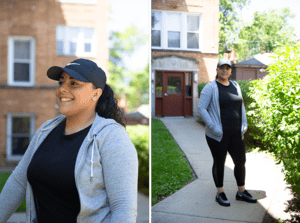
Cassiette Cartagena, 31, stands outside her home in Chicago’s Humboldt Park neighborhood. She is one of four participants in the R2I2 program.
Cassiette Cartagena, a LUCHA resident participating in R2I2, is determined to keep a stable home for her five kids and to make sure they don’t have to struggle in life as much as she has. “When I was 19, I had two sons in a shelter. I don’t want to relive that in any shape or form,” she said.
The 31-year-old single mother is “constantly budgeting every breath of every day.” She works more than 40 hours a week, checks her mobile banking app constantly, tracks how many days are in a pay period to make sure her paycheck is as big as possible, goes to two grocery stores to get the best deals on food, and is slowly paying off her car loan to lower her debt-to-income ratio so she can become a property owner. On top of that, during the pandemic, she’s added the roles of “full-time teacher, full-time chef, and full-time mental health counselor.”
But coming from a low-income family, she entered adulthood with no savings and unsure of how banking worked, which meant she got a late start on building credit and savings. “I was always told never open a credit card, they’re bad, you’ll get into debt,” she said. “A lot of people have an insecurity with banks because when they think about banks, they think about banking fees.
Her coworker at O’Hare International Airport, where she works as a dispatcher, first taught her about setting up a credit card when she was in her late 20s. “I was intrigued and thought, man, I could do that,” Cartagena said. “I opened my first credit card two years ago, and within nine months, I received a credit increase. I was already booming with trying to constantly try to keep ahead of things.”
She had a savings account with another bank before R2I2, but she’s often needed to use it to pay for regular expenses. Cartagena hasn’t yet withdrawn from or added to her Liberty Bank savings account, but she hopes that once her hours pick back up as the airport gets busier, she’ll be able to add to the account. And she hopes those savings, along with the program’s financial coaching services, can help her prepare to buy a house and secure long-term economic security for her family.
“That’s my motive right now: if something happens and my kids need to call mom, I’ll have the money to help them,” Cartagena said.
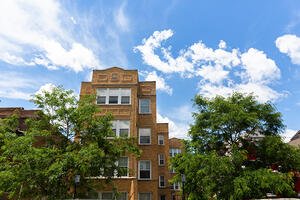
A building in Humboldt Park operated by LUCHA, a community-based, nonprofit affordable housing provider in Chicago. LUCHA partnered with Bickerdike and Elevate Energy to create R2I2.
Jennifer Aviles, another resident participating in the R2I2 program, has lived with her three kids in one of Bickerdike’s properties for almost seven years. The 37-year-old was furloughed from her job at Starbucks in March because of COVID-19, but the company kept paying her until the end of May. She hopes to soon collect unemployment insurance because the store is still closed.
That steady income, despite the pandemic, meant Aviles could contribute $1,000 of her Coronavirus Aid, Relief, and Economic Security Act stimulus check to her R2I2 savings account. And she’s determined to keep adding to it. “Once I got started with that couple-hundred-dollar kick-start, that looked really pretty, so I wanted to keep adding,” she said.
Aviles hopes the small steps of setting up a savings account and learning how to better manage her finances will set her up for a life where she’ll no longer have to worry about having enough money to pay the next month’s rent. “These are little steps to get me to where I want to be,” she said.
Leveraging partnerships to help residents make small changes with a big impact
R2I2 has highlighted the importance of rooting programs in residents’ experiences, leveraging evidence to drive the program design, and establishing partnerships between organizations with different expertise and resources.
Those partnerships can be critical when crises, like the COVID-19 pandemic, suddenly threaten many residents’ financial security. When the pandemic’s devastating economic toll became clear, Bickerdike, LUCHA, and Elevate worked together to secure a foundation grant to provide 100 Bickerdike and LUCHA residents with rent relief for May. The two housing organizations quickly surveyed their residents to find out who had the greatest financial need and reported to Elevate to distribute the funds.
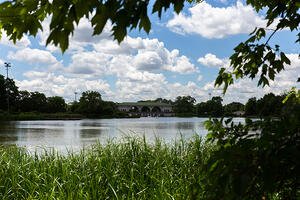
Humboldt Park, on Chicago’s West Side.
“Having partnerships that can work together is really important, rather than having everyone scramble to do their own thing in a crisis,” said Rachel Scheu, director of research and innovation at Elevate Energy. “Because we had that trust and infrastructure in place, we could tailor and be flexible to the needs of the different organizations and residents.”
Even though R2I2 is still in its early stages with just a few families, the project partners hope the program will demonstrate that even a small amount of savings can help people be more financially resilient and stay in their homes.
“We want to excite people with the idea that if low-income people are helped and encouraged to save, and if you have a community that helps them do that and you have some resources, their lives could be much more stable,” said Michael Burton, asset management director at Bickerdike. “That not only helps the family, but it has a societal benefit that goes beyond the small investment. If people lose their homes, it’s more expensive to house them in a shelter or social services system. It’s so much better to keep people in a stable environment.”

